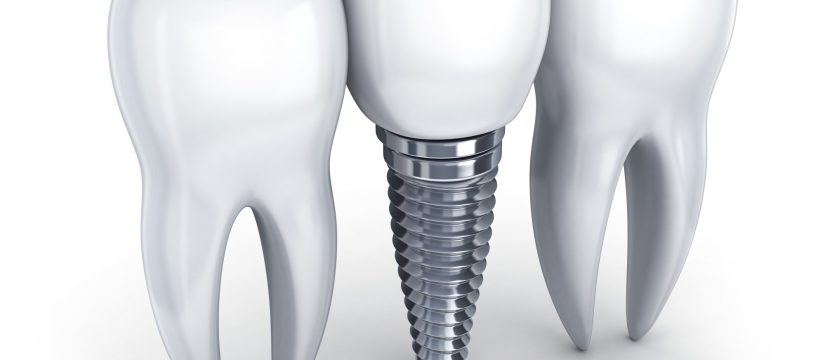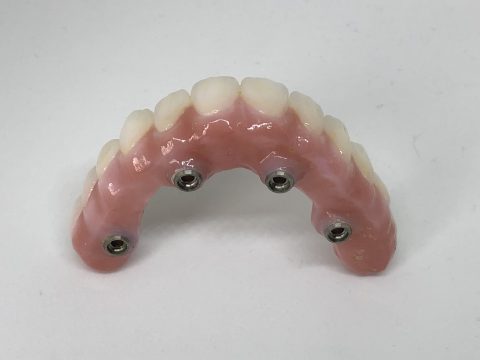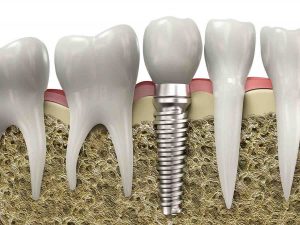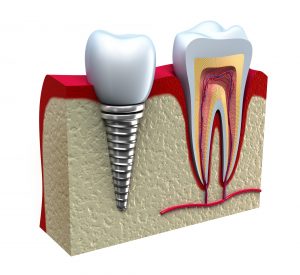
Dental implants have a vast number of benefits. They’re more comfortable than dentures. You can use them to replace just one tooth, several teeth or all your teeth. Plus, they even help make up for the damage done by missing or decaying teeth.
But how strong are dental implants? Are they as strong as your teeth? More so?
There’s no right answer to this question because every mouth is different. However, you should know that the key to successfully placing (and using) an implant lies not necessarily in the implant itself but your jawbone.
Here’s what you need to know about the strength of dental implants, and whether you’re a candidate.
What Is a Dental Implant?
Although the entire structure often picks up the name “dental implant,” your new tooth is actually made of three parts.
The implant itself is the titanium post set into your jaw bone. It is placed where your old root used to be. It’s called the implant because it is the only part that is implanted into your jaw: it is also the strongest part of the construction. If you’re considering dental implants Rockville MD, this titanium post is a critical component of restoring both functionality and appearance to your smile.
Attached to the implant is the abutment, which connects it to the crown. The crown is then the visible tooth.
So, when we talk about the dental implant, we mean the titanium screw.
Are Dental Implants Better than Natural Teeth?
The question is a complicated one.
In many cases, your best choice is always to protect your natural teeth and restore them when possible. Like the rest of your body, your teeth can undergo minor repairs on their own through your immune system and metabolic processes.
Because an implant is an invader, your body’s cells don’t naturally regenerate to fix them.
Keep in mind that your teeth’s natural ability to regenerate only goes so far. They can’t grow back if broken or stop more severe infections. Your teeth rely on you to protect them through brushing and cleaning.
With this in mind, once you reach a point where a tooth is significantly decayed, then a dental implant (the screw) will be stronger than a natural tooth.
Why? Because dental implants won’t allow further decay. For example, you can’t get cavities in an implant. Additionally, removing the decayed tooth allows the jaw bone to begin to heal. Implants can also help improve bone density (and bone grafts further improve it).
The bottom line: a dental implant isn’t a substitute for a healthy natural tooth. However, they are far superior to decaying teeth.
How Strong Is a Crown Compared to Real Teeth?
The same rule that applies to dental implants also applies to crowns.
Dental Crowns typically use a porcelain or resin construction. The most durable crowns are typically made of metal, but new products may include porcelain fused to metal or zirconia so that you can keep the look of a natural tooth. As a result, they are very reliable and can last well over a decade as long as you take care of them and the surrounding teeth. (Read: don’t open packages with your teeth or crunch ice cubes all day.)
A crown restores the strength of the original tooth, but like an implant, it’s not a replacement for a healthy natural tooth.
Can You Break an Implant?
You can break a natural tooth, and you can break an implant.
It is possible to break the implant with enough brute force. You can also bend or break the abutment (connecting the implant to the crown), and the same energy can also break a crown (prosthesis) – just like a natural tooth. However, unlike an implant that lasts a lifetime, your prosthesis may need a replacement in the future (depending on how well you care for it).
Even still, you won’t break an implant by eating an apple or chowing down on some corn on the cob. Because an implant (and crown) don’t decay, you generally need serious trauma to cause that kind of damage.
In some cases, you can also break an implant if you put too much pressure on it before it fully bonds to your jaw bone – a process called osseointegration. When you get same-day implants, you need to be careful with it for the first few weeks and months. Avoiding hard or sticky foods is one half of the requirement. You might also need to wear a nightguard to prevent grinding in your sleep.
If you do suspect you broke an implant, you need to see the dentist ASAP.
 How to Fix a Broken Implant
How to Fix a Broken Implant
Replacing a crown is relatively simple. As long as the abutment and implant are okay, then you only need to recreate the crown from the mold and replace it.
However, if the screw itself breaks, then your only option is a replacement.
You may also need a bone graft depending on the cause of the break. If you do, then you will have a waiting period of several months between the graft and the replacement of your implant.
Your Jaw Bone Makes a Huge Difference
The ability of the implant to successfully fuse into your jaw and your jaw’s ability to support it over the short and long-term perhaps make the most significant difference for your implant.
These two factors also determine whether you qualify for implants at all.
Without a healthy, sufficient jawbone, a surgeon can’t place the implant. And if they do, it’s far more likely to break. Usually, it is the result of implant failure, which means the osseointegration process didn’t occur.
Implant failure may also be the result of the infection of the implant site or improper design.
Jawbone deterioration is more common than many patients believe, and there can be many reasons for it. Some of them have nothing to do with the health of your teeth. The most common causes of jawbone loss or deterioration include:
- Periodontal disease
- Trauma to the jaw
- Tooth extractions
- Congenitally missing teeth
- Osteomyelitis (bacterial infection)
- Sinus proximity
- Sinus enlargement
- Dentures and bridgework
- Tumors on the bone
- Osteoporosis
Many people choose a dental implant to replace a missing tooth. But losing the tooth can actually put you at a disadvantage because it impacts your jaw health. When an adult tooth is no longer in place, then the jawbone deteriorates.
Why? Because your chewing and biting stimulate the jawbone. Your teeth find the anchor in the alveolar bone, and when it doesn’t receive the stimulation it requires, it breaks down. Your body no longer uses it, so it disappears. This is also what puts people with congenitally missing teeth or those who use dentures (particularly ill-fitting dentures) at a bone density disadvantage.
Bone loss happens quickly: the majority of the damage occurs within the first eight weeks after you lose the tooth or have it extracted. It then continues throughout your life, unless you provide a new means of stimulation, like an implant.
Bone Grafts Can Help
If you have a weak or small jawbone, then you may benefit from a bone graft. A bone graft restores the volume to your bone. The volume is what you need to place an implant.
The graft usually comes from another part of the jawbone (upper or lower).
The procedure takes between an hour and an hour a half. You then spend two weeks recovering: most patients experience pain, swelling, and nausea during the days after the graft. If you previously used dentures (partial or full), you can’t use them until you complete your post-operative appointment.
It takes three to six months for the bone graft to take and for the treatment area to form into a solid bone mass. Once complete, your dentist reassesses the area to see if it made a significant enough difference to contribute to your candidacy for implants.
How Strong Are Dental Implants?
Are dental implants as strong as real teeth? They are stronger.
How strong dental implants are depends on several factors, but mostly, it depends on your jawbone. Titanium rarely if ever breaks. Titanium metal is stronger than a tooth. Implants can break but don’t break on their own. But if it doesn’t fuse to your jawbone correctly, it can cause enormous problems for you.
However, issues like trauma can also cause a dental implant to break. Usually, if the implant breaks, your abutment, crown, and the jaw are also impacted. Teeth can also break under large forces.
You are likely not the right candidate for dental implants if there’s a significant risk of a weak implant. Your dentist in Rockville MD may assess your bone to see whether a bone graft can help. If so, you’ll need a bone graft and then a three to six month waiting period to ensure the bone fuses together before you’re ready for your implant and crown.
Are you interested in replacing a missing or damaged tooth with a dental implant? We can help you achieve a healthy smile (and jawbone). Contact Rockville Dental Arts for a dental implant consultation.
Serving patients in Rockville, Potomac, Bethesda, Gaithersburg, Germantown, Aspen Hill, Frederick, Derwood, North Potomac, Silver Spring and Washington DC



